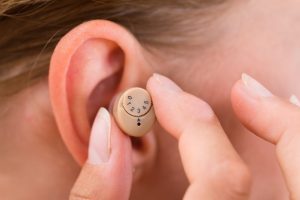 Tinnitus – ringing in the ear – can be addressed with the use of hearing aids. Tinnitus is more common among people with hearing impairment, compared to those with normal hearing, with rates between 70 and 85 percent among those with hearing problems, compared to only 10 to 15 percent for those with normal hearing.
Tinnitus – ringing in the ear – can be addressed with the use of hearing aids. Tinnitus is more common among people with hearing impairment, compared to those with normal hearing, with rates between 70 and 85 percent among those with hearing problems, compared to only 10 to 15 percent for those with normal hearing.
Tinnitus has been shown to have a negative impact similar to that of hearing loss, impeding on one’s physical and emotional well-being.
Advertisement
In a large-scale study on tinnitus in the U.S., 39 percent of people with hearing impairments reported that tinnitus was the main reason that they had not gotten hearing aids. There is no explanation for such low rates of adoption. One theory suggests that with milder hearing loss, tinnitus causes more problems in daily life than hearing loss. Plus, people may be unaware of the fact that hearing aids can alleviate tinnitus rather than worsen it.
There is less stigma associated with tinnitus than with hearing loss. Wearing hearing aids for tinnitus treatment may have people feeling judged by others that they cannot hear. On the other hand, people are more willing to improve their tinnitus symptoms than their hearing loss. This was demonstrated by a free trial campaign in Switzerland. People were offered hearing aids as a means to treat tinnitus rather than hearing problems. The campaign was intended to increase people’s awareness that hearing aids can treat tinnitus and to encourage them to seek treatment for their hearing loss.
How can hearing aids help tinnitus patients?
Hearing aids can help mask the ringing commonly heard in tinnitus. Hearing aids have come a long way in their technology. While previously they worked to amplify sounds, with new advancements and better fittings hearing aids can successfully alleviate tinnitus, too. Hearing aids have also become slimmer and less obvious, so they aren’t as noticeable as they once were.
Hearing aids can improve tinnitus by:
- Increasing information available to the brain (amplifying background sounds and making the tinnitus effects less audible)
- Improving communication, which in turn can help reduce stress
- Helping compensate for hearing loss
- Helping you to become accustomed to tinnitus sounds as they aren’t as noticeable anymore.
It’s important that you opt for well-fitted hearing aids to get the best relief of tinnitus. These are known as open-fit hearing aids, which use a fine tube or speaker placed in the ear canal to deliver the sound. Not only will open-fit hearing aids help with tinnitus, but they are also best suited for mild hearing loss, thus helping improve your hearing even in the slightest of matters.
Speak with your specialist or doctor about hearing aid options, especially if you are dealing with hearing loss and tinnitus simultaneously. You may find that they greatly improve both conditions, and you can go back to enjoying your daily life.
